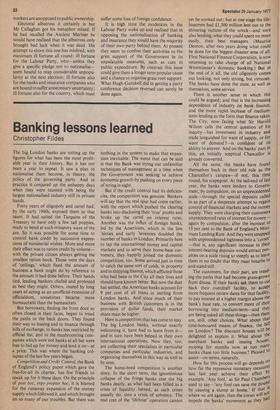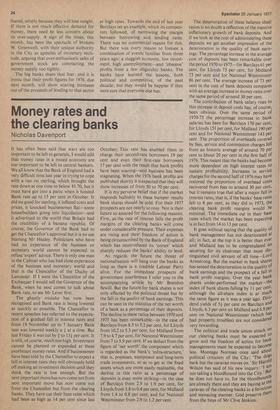Banking lessons learned
Christopher Fildes
The big London banks are totting up the figures for what has been the most profitable year in their history. But it has not been a year to repeat. It saw a plan to nationalise them become, in theory, the policy of the governing party. And in practice it conjured up the unhappy days when they were taunted with being the largest nationalised industry still in private hands.
Forty years of oligopoly and cartel had, by the early 1960s, exposed them to that taunt. It had suited the Tarquins of the Treasury to have only a few tall poppies, ready to bend at each minatory wave of the axe. So it was possible for some time to control bank credit by successive expressions of ministerial wishes. More and more their effect was to ration credit by volume— with the private citizen always getting the smallest ration book. Those were the days of 'ceilings,' which fixed the amount of business a bank might do by reference to the amount it had done before. Their hands tied, leading bankers chafed and protested as best they might. Others, inured by long years of acting as an unofficial extension of officialdom, sometimes became more bureaucratic than the bureaucrats.
But borrowers, finding the front door so often closed in their faces, began to tread the paths to the back doors. They found their way to leasing and to finance through bills of exchange, to banks less restricted by official fiat, and to the mushrooming companies which were not banks at all but were free to bid up for money and lend it on—at a price. This was where the banking collapses of the last few years began.
Competition and Credit Control, the Bank of England's policy paper which gave the free-for-all its charter, has few friends to speak up for it these days. On the principle of post hoc, ergo propter hoc, it is blamed for the runaway expansion of the money supply which followed it, and which brought on so many of our troubles. But there was
nothing in the system to make that expansion inevitable. The worst that can be said is that the Bank was trying out unfamiliar techniques of management at a time when the Government was seeking to achieve economic growth by pushing on every piece of string in sight.
But if the credit control had its deficiencies, the competition was genuine. Bankers will say that the real spur had come earlier, with the report which pushed the clearing banks into disclosing their 'true' profits and broke up the cartel on interest rates. Another was the influx of foreign banks, led by the Americans, which in the late 'sixties and early 'seventies doubled the number of banks in London. Primarily here to tap the international money and capital markets and to serve their home-base customers, they happily joined the domestic competition, too. Some arrived just in time to catch the same sort of colds, in property and in shipping finance, which afflicted those who had been in the City all their lives and should have known better. But now the dust has settled, the American banks account for 9 per cent of all loans in sterling from London banks. And since much of their business with British customers is in the provision of dollar funds, their market share must be higher.
Here is competition that has come to stay. The big London banks, without exactly welcoming it, have had to learn from it— and in turn have been helped in their own international operations. Now they, too, are collecting their specialists in particular companies and particular industries, and organising themselves in this way as well as by area.
The home-bred competition is another story. In the short term, the ignominious collapse of the fringe banks cost the big banks dearly, as what had been billed as a crisis of liquidity turned, as such crises usually do, into a crisis of solvency. The real cost of the 'lifeboat' operation cannot
yet be worked out; but at one stage the lifeboatmen had £1,300 million lent out to the shivering victims of the wreck—and were also lending, what they could spare no more easily, their best managers. (Maurice Denton, after two years doing what could be done for the biggest disaster area of all, First National Finance Corporation, is now returning to take charge of all National Westminster's domestic banking.) But at the end of it all, the old oligopoly comes out looking, not only strong, but virtuous. The banks have done the state, as well as themselves, some service.
There is another sense in which this could be argued; and that is the increasing dependence of industry on bank finance, and the more rapid increase of mediumterm lending as the form that finance takes. The City, now facing what Sir Harold Wilson calls the central question of his inquiry--has investment in industry and trade languished for want of supply, or for want of demand ?—is confident of its ability to answer. And on the banks' part in this, an initially sceptical Chancellor is already converted. All the same, the banks have found themselves back in their old role as the Chancellor's catspaw—if not, this time round, his scapegoat. At the tail-end of last year, the banks were lenders to Government, by compulsion, on an unprecedented scale—through the special deposits called in as part of a desperate attempt to regain control of financial markets and the money supply. They were charging their customers unprecedented rates of interest for moneYagain by compulsion, after the increase to 15 per cent in the Bank of England's Minimum Lending Rate. And they were straciPed, with unprecedented tightness into a 'corset —that is, any significant increase in their interest-bearing deposits would attract penalties on a scale rising so steeply as to leave them in no doubt that they must breathe In and stand still.
The customers, for their part, are treading the paths that had become grass-growl' from disuse. If their banks ask them to cut back their overdraft facility, to accePt more frequent review dates for that facilitY, to pay interest at a higher margin above the bank's base rate, to convert more of their borrowing into medium-term—and they are being asked all these things—then there are, still, other choices. What about dia.!, time-honoured means of finance, the bin on London? The discount houses will he delighted to explain it. What about the merchant banks and issuing houses, moping for months now as too many banks chase too little business? Pleased to assist—on terms, naturally. How far this process will go depends on how far the repressive monetary measures late last year achieve their effect bY example. 'Any fool,' as Sir Paul Chamber; used to say—'any fool can save the poo. by causing a slump at home.' If that where we are again, then the corset will no,' impede the banks' movement as they ha'
feared, simply because they will lose weight. If there is not much effective demand for money, there need be less concern about its over-supply. A sign of the times, this month, has been the spectacle of brokers W. Greenwell, with their unique authority in the City as apostles of monetary rectitude, arguing that over-enthusiastic sales of government stock are contracting the money supply too tightly, The big banks share that fear; and it is ironic that their profit figures for 1976, due next month, will show soaring increases out of the proceeds of lending to that sector at high rates. Towards the end of last year Barclays set an example, which its competitors followed, of narrowing the margin between borrowing and lending rates. There was no commercial reason for this. But there was every reason to foresee a combination of events familiar from three years ago: a sluggish economy, low investment, high unemployment—and 'obscene' profits from a few oligarchic banks. The banks have learned the lessons, both political and competitive, of the past decade; but they would be happier if they were sure that everyone else has.











































 Previous page
Previous page